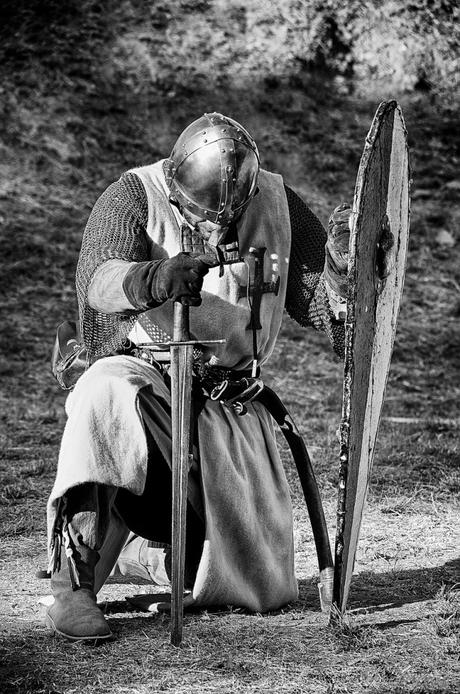
Sometimes people assume that, when the Church launched the Crusades in the Middle Ages, there was a self-serving reason behind it. It wasn’t the result of piety or the desire to rescue the oppressed. Rather, it was about the Church’s greed and the desire to control foreign lands and expand a power base.
These cynical claims certainly have a ring of modern suspicion about them. There’s always a conspiracy somewhere, right? But do these claims actually fit with the surviving historical data?
The Crusaders Became Financially Challenged, that Doesn’t Mean they Were Greedy
There is a cynical claim that “the crusading impulse rescued many serfs and landowners from desperate economic straits,”[1] and that “the Crusades fused … Medieval impulses: piety, pugnacity and greed. All three were essential.”[2]
However the evidence would suggest this cannot be the motivation behind the Crusades. The data shows that “crusading was a very expensive undertaking … a few financed their participation by selling property, and some huge sales were involved.”[3] The Crusades were simply “ruinously expensive,”[4] for the volunteers.
What’s more, we know that the church latterly imposed a very unpopular taxation to fund future Crusades.[5] If even the medieval Church was unable to meet the financial burden of the war, how can we reasonably claim that the Crusades lined anyone’s pockets?
The Church Was Not Seeking to Dominate and Grow an Empire Through Crusading
Did “an expansionist, imperialistic Christendom brutalize, loot and colonize a tolerant and peaceful Islam,”[6] during the crusades?
I have already made the point here and here that the Papal aim wasn’t colonization but liberation of the people and Christian relics in Jerusalem. And the historical data supports this claim. The majority of the Crusaders returned home to Western Europe after the first Crusade when they believed their liberation mission was complete.
Yet you might disagree with me here.
“Why,” you might ask, “were the Latin States established after the first Crusade? Cities like Antioch and Edessa were established under Crusading rule. Doesn’t this PROVE there was imperialistic tendencies behind the war?” No. I would say the opposite is true. Most Crusaders returned home, while a minority remained because they anticipated a counter-attack by the Muslim armies. They stayed to defend the liberty of those they successfully freed during the first Crusade.
But why couldn’t the Eastern Church defend these lands themselves? Earlier, I explained that the first Crusade began because the Eastern Emperor Alexis had requested help from Roman Pope Urban. So – why couldn’t Alexis’ forces have guarded these lands themselves after the Muslims left?
Unfortunately the fragile alliance between Eastern and Western forces during the first Crusade did not hold and there was a big falling out between them.[7] The Western forces decided, therefore, not to return control of the freed city of Edessa to Emperor Alexis. Given that Western forces controlled this land, they could not therefore also then ask Alexis for help defending their city! The Western forces had to do this themselves, and their strategy had some initial success, “lead[ing] to the Muslim backing off after the first Crusade.”[8] Sadly the peace did not last, and the Muslim armies regrouped and attacked again.
In order to protect the Latin States and the Christian pilgrims who traveled through them, the Knights Templars and the Order of the Hospitaliers were both instituted. They were both about “chivalry and protection … an oasis for those on Christian pilgrimage.”[9] These groups were not borne out of imperialistic tendencies. Rather, they were a defensive measure against an Islamic aggressor.
Many people will scoff at such an idea today, assuming the truth to be far less pious and much darker. Yet surely this cynicism isn’t borne out by the evidence, rather it is simply the result of modern people reading their contemporary ideas into this period of Medieval history. Today, we are incredulous that, “religious belief [could be] the real motivator for … activity … [so must be] a pretext for economic or political motives.”[10] No – this is simply modern people behaving anachronistically. We are forcing our ideas into history. Namely, that we are unwilling to believe religious piety could be a motivator for any action. Yet the historical evidence suggests it was piety, not imperialism, that drove the Crusader.
Surely the problem is therefore with us today, not them then?
[1] Yosef Eisen, “The Bloody Crusades,” Chabad.org, accessed October 24th, 2018, https://www.chabad.org/library/article_cdo/aid/2617029/jewish/The-Bloody-Crusades.htm.
[2] Paul F. Crawford, “Four Myths about the Crusades,” Intercollegiate Review, Spring 2011, accessed October 24th, 2018, https://home.isi.org/four-myths-about-crusades.
[3] Rodney Stark, God’s Battalions The Case for the Crusades (New York: HarperCollins Publishers Inc, 2009), kindle edition, 111.
[4] Crawford, “Four Myths About the Crusades.”
[5] Stark, God’s Battalions, 234, summarised.
[6] Stark, God’s Battalions, 7.
[7] C. Michael Patton, The Second Crusade The Crusades Bootcamp, Credo Courses, http://www.credocourses.com/product/crusades-boot-camp/, summarised.
[8] Ibid.
[9] Ibid.
[10] Robinson, “Three Myths,” 30.
